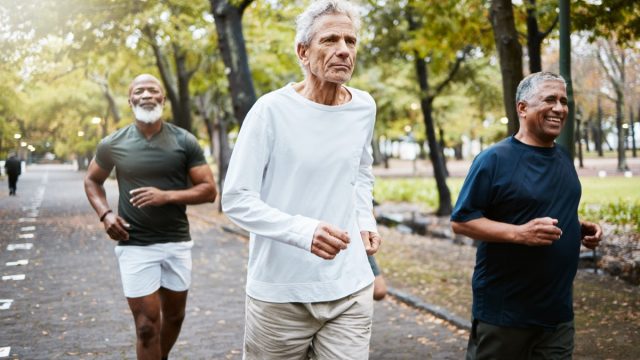How Exercise Could Be Aging You Faster, New Study Reveals

Since childhood, we’ve been taught that it’s vital to get moving and eat well to keep our bodies healthy for longer. These claims have been backed up by countless studies, with research regularly associating physical activity with increased life expectancy. In fact, research has also linked more exercise to “maximum mortality reduction,” per the American Medical Association (AMA). But according to a new study, there’s something else to consider, as exercise could actually be aging you faster.
RELATED: Why Walking Only 3,867 Steps a Day Is All You Need, Science Says.
A June 2023 preprint study has yet to be peer-reviewed by a journal, but according to The New York Post, it received a national sports medicine prize in Finland. The findings challenge previous beliefs about exercise, concluding that being active may not lead to a longer life in all cases.
Researchers at the University of Jyväskylä evaluated data from adult twins in Finland, including participant questionnaires from 1975, 1981, and 1990, with follow-up continuing until 2020. Participants self-reported their daily activity, referred to as leisure-time physical activity (LTPA), and were then classified into one of four classes: sedentary (13.4 percent of participants), moderately active (36.7 percent), active (38.7 percent), and highly active (11.2 percent).
While it’s probably not surprising, researchers found that those in the active classes were between 15 and 23 percent less likely to die when compared to those in the sedentary class.
However, things got more interesting when they considered other health-related factors, including education, body mass index (BMI), smoking, and alcohol consumption. When taking these into account, active participants were only 7 less likely to die than those in the sedentary classes. Researchers also noted that there were “no additional benefits provided by higher levels of LTPA.”
But that’s not all. More exercise was also associated with increased biological age (the age of cells and tissues, which differs from chronological age). Blood samples showed that those in the highly active class were “biologically older” than those in the moderately active and active classes.
RELATED: Silent Walking Is the Latest Wellness Trend Everyone’s Talking About.
After adjusting for lifestyle factors, people who exercised most were an average of 1.3 years older than those in the moderately active class and 1.8 years older than those in the active class. Participants in the sedentary class were also biologically older than those who were moderately active and active.
Overall, researchers concluded that exercise might not be the main thing reducing the likelihood of death. Instead, being active could indicate people are healthy and make healthier choices, which “co-occur” with a lower mortality risk.
Researchers did note a few limitations to the study, however, including the fact the LTPA was self-reported. With patients answering questions themselves, responses can be affected by participants’ memory and interest in making themselves look good.
As George Savva, PhD, a senior research scientist at the Quadram Institute in the U.K., told The Times of London, per The New York Post, the study had a “powerful research design,” but could have also run into issues when filtering for BMI. According to Savva, when doing this, researchers may have missed some effects of participants’ physical activity.
RELATED: For more up-to-date information, sign up for our daily newsletter.
Best Life offers the most up-to-date information from top experts, new research, and health agencies, but our content is not meant to be a substitute for professional guidance. When it comes to the medication you’re taking or any other health questions you have, always consult your healthcare provider directly.